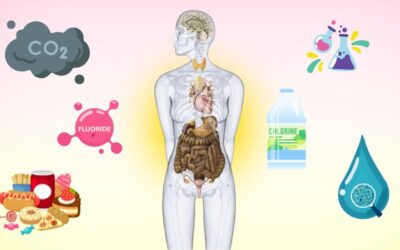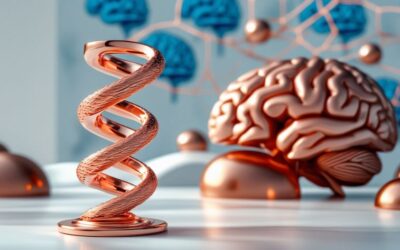Over the past few years, there’s been a huge spike in cases of hypothyroidism and suboptimal metabolism, and it’s not just due to one single cause. Rather, it’s a mix of factors coming together, creating a perfect storm. To make matters worse, often hypothyroid is being misdiagnosed as menopausal symptoms, depression, heart issues, and more. In his article you will learn how you can support your thyroid naturally with supplements and lifestyle changes.
Common Symptoms of Low Thyroid Function
Without seeing a full thyroid panel blood test, you may be able to pinpoint your thyroid issues. Some common symptoms of hypothyroid include:
Fatigue: Feeling constantly tired? That’s because when your thyroid is sluggish, your body’s energy production slows. Thyroid hormones play a key role in how your cells use oxygen to make energy, and without enough of them, fatigue sets in.
Weight Gain: Gaining weight, even though you’re eating well and exercising? Low thyroid function means your metabolism slows down, making it harder for your body to burn calories and fat. Plus, hypothyroidism can mess with your appetite and muscle tone, leaving you less motivated to stay active.
Cold Sensitivity: Always cold, even when others are fine? Hypothyroidism can reduce blood flow, especially to your hands and feet, and lower your body’s overall temperature, making you feel cold all the time.
Dry Skin and Hair: If your skin is dry and flaky or your hair feels brittle, it could be your thyroid. The hormones from your thyroid help with cell regeneration and oil production, so when they’re lacking, your skin and hair can suffer.
Constipation: Thyroid hormones help keep your digestive system moving, so when levels are low, you might experience constipation. The gut slows down, and less digestive juice and water are absorbed, leading to hard, dry stools.
Muscle Weakness and Joint Pain: Feeling weak or experiencing joint pain, especially in your arms and legs? Hypothyroidism can lead to muscle weakness and swelling, causing discomfort and puffiness.
Swelling (Edema): If your face, especially around the eyes, is puffy, it’s likely due to fluid retention caused by low thyroid hormones.
Hoarseness: Noticing changes in your voice? The thyroid hormones, especially T3, play a role in how your vocal cords work. Low thyroid function can lead to a hoarse voice and even vocal fatigue.
Depression: Low thyroid function is closely linked to depression, as thyroid hormones regulate mood-related neurotransmitters like serotonin and norepinephrine. If you’re on antidepressants but still feeling down, undiagnosed hypothyroidism might be the issue.
Memory and Cognitive Issues: Brain fog or trouble concentrating? Hypothyroidism slows down mental processes, leaving you with cognitive issues and trouble with memory.
Menstrual Irregularities: Women with low thyroid function often experience irregular periods, heavier bleeding, or worsened PMS. That’s because the thyroid helps regulate the hormonal balance tied to the menstrual cycle.
Bradycardia (Slow Heart Rate): Hypothyroidism can lead to a slower heart rate since the thyroid hormones influence how forcefully your heart pumps blood.
High Cholesterol: Struggling with high cholesterol? Your thyroid plays a big role in how your body processes fat, and low thyroid function can cause elevated cholesterol levels.
Muscle Cramps: Experiencing leg cramps? Poor circulation, electrolyte imbalance, and even nerve dysfunction from hypothyroidism can all contribute to painful muscle cramps.
Puffy Face: Swelling in your face is common with hypothyroidism due to poor circulation and fluid retention. The accumulation of specific sugars in the skin tissues also causes puffiness, especially in the face.
All of these symptoms can add up, making life harder to navigate. If any of these sound familiar, it might be time to take a closer look at your thyroid health and explore ways to bring your body back into balance.
Causes of Hypothyroidism
The rise of hypothyroidism (underactive thyroid) is not caused by just one thing; it’s a mix of many different factors that have come together, creating the perfect storm for low thyroid function. Here’s a breakdown of some of the most significant causes:
Iodine Deficiency
This is the number one cause of hypothyroidism. Iodine is essential for your thyroid to make hormones like T3 and T4 (the numbers represent the amount of iodine molecules). Without enough iodine in your diet, your thyroid can’t function properly. Shockingly, 96% of Americans are iodine deficient, which sets the stage for thyroid problems and low metabolism.
Iodine Disruptors
Even when we’re not getting enough iodine, certain environmental toxins make things worse. Fluoride, bromide, chlorine, and perchlorate (found in fertilizers and drinking water) block iodine from being absorbed by the thyroid. These chemicals can take over your body’s iodine receptor sites, slowing down your thyroid and causing your metabolism to tank. It’s not just your thyroid that suffers; iodine is essential for the health of all your cells, so these disruptors can lead to a variety of chronic diseases.
Endocrine Disruptors
Toxins known as endocrine disruptors can interfere with the balance of your hormone system, including your thyroid. Chemicals like BPA (found in plastics), certain pesticides, and industrial chemicals are notorious for throwing your thyroid off balance.
Heavy Metals
Exposure to lead, mercury, and other heavy metals can mess with your thyroid’s ability to produce hormones. These metals interfere with how the thyroid works and can build up in your body, leading to dysfunction over time.
Poor Liver Health
Your liver is a powerhouse organ with countless essential jobs, including converting T4 into the active T3 hormone, which fuels your brain and plays a critical role in preventing conditions like Parkinson’s. In addition to its role in regulating thyroid hormones, metabolism, and energy levels, your liver takes care of several other vital functions:
- Blood Production & Detoxification: It filters out toxins and chemicals from your blood, creates fresh blood, and breaks down old red blood cells.
- Bile Production: The liver produces bile to digest fats and stores extra bile in the gallbladder for when it’s needed during digestion.
- Metabolism: It helps convert proteins, fats, and carbohydrates into energy your body can use, keeping you fueled throughout the day.
- Immune Support & Clotting: The liver produces essential proteins that help fight off infections and allow your blood to clot properly.
- Hormone Balance: It regulates sex, thyroid, and stress hormones, ensuring your body stays balanced.
- Glucose Storage: Your liver manages blood sugar by storing glucose and releasing it when your body needs an energy boost.
- Detoxification: It neutralizes toxins and makes sure they’re eliminated from your body, keeping harmful substances at bay.
- Albumin Production: The liver produces albumin, a protein that transports hormones and other substances throughout your body.
- Bilirubin Processing: It helps clear out old red blood cells and processes bilirubin to prevent jaundice.
Perfluorinated Compounds (PFCs)
These chemicals, found in non-stick cookware and waterproofing products, are also linked to thyroid problems. They may alter thyroid hormone levels and disrupt your overall metabolism.
Radiation
Whether it’s from medical treatments or environmental exposure, radiation can harm your thyroid. People exposed to high levels of radiation are more likely to develop hypothyroidism or even thyroid cancer.
Autoimmune Thyroiditis (Hashimoto’s Disease)
This is the most common cause of hypothyroidism. In Hashimoto’s, your immune system mistakenly attacks your thyroid gland, causing it to lose its ability to function properly over time.
Spike Protein
The spike protein has affected organs like the liver and gut, leading to sluggish thyroid function, inflammation, and hormonal imbalances. This makes it harder for your thyroid to keep up, worsening symptoms of hypothyroidism.
Stress
Chronic stress is a major factor in thyroid issues. Long-term stress raises cortisol levels, which can slow your metabolism and lead to weight gain, especially around the belly. High cortisol also leads to insulin resistance, making it even harder to manage your weight and thyroid health.
Certain Medications
Some medications can interfere with thyroid function. Drugs like lithium (used for bipolar disorder) and amiodarone (for heart rhythm disorders) can contribute to hypothyroidism.
Thyroid Surgery or Radiation Treatment
Having part or all of your thyroid surgically removed or undergoing radiation therapy in the neck area can reduce thyroid function significantly, sometimes leading to permanent hypothyroidism.
Congenital Hypothyroidism
Some people are born with an underactive thyroid due to a congenital defect. Thankfully, newborns are typically screened for this condition shortly after birth.
Pituitary Gland Disorders
The pituitary gland produces thyroid-stimulating hormone (TSH), which tells the thyroid to produce hormones. When there’s a disorder affecting the pituitary gland, it can cause a reduction in TSH production, leading to hypothyroidism.
Inflammatory Disorders
Chronic inflammation in the thyroid, even when it’s not related to autoimmune issues, can still affect how well your thyroid functions, potentially leading to hypothyroidism.
Infections
Though rare, certain infections can affect the thyroid, causing inflammation and leading to thyroid dysfunction.
Age and Gender
Women, especially as they age, are more likely to develop hypothyroidism. It’s most common in women over 60.
Genetic Factors
There’s a genetic component to thyroid issues as well. If you have a family history of thyroid conditions, your risk of developing hypothyroidism is higher.
With so many factors contributing to hypothyroidism, it’s no wonder this condition has become more common. Understanding these causes can help you take steps to support your thyroid and overall health.
Supplements to Support Your Thyroid
If you’re struggling with thyroid issues, here are some powerful supplements to help naturally restore thyroid function while increasing mental and physical energy:
Acceleradine® Iodine
Most of us are iodine deficient, and that is the number one cause of thyroid issues. Iodine is essential for supporting thyroid hormone production, detoxifying harmful toxins, and helping the liver convert inactive thyroid hormones into active ones. It boosts cellular energy, which translates to improved mood, cognition, fat oxidation, metabolism, and physical stamina. On top of that, it helps clear out toxins from the thyroid like lead, fluoride, and chlorine, which can disrupt thyroid function and contribute to cognitive issues, weight gain, and fatigue down the line.
What makes Acceleradine® Iodine special is that it’s the only iodine supplement that uses a single atom form (I-), meaning it’s easily absorbed by all cells in the body. Most other iodine supplements need to be broken down first, which limits absorption. Plus, it’s enhanced with scalar frequencies designed to increase its ability to detox the cells and feed the cells the iodine for even better results.
Accelerated Thyroid®
This supplement is the only thyroid supplement that combines grass-fed thyroid glandular, Ayurvedic herbs like Kanchanara (which helps detoxify the thyroid, break down thyroid nodules, and eliminate water retention), and essential amino acids to naturally boost thyroid function.
The combination of the ingredients also helps increase circulation to the brain and body, lifting brain fog, increasing energy and metabolism, and boosting mood. With the added benefit of scalar frequencies, it helps detoxify heavy metals and radiation while helping your thyroid stay balanced.
Dr Amie Hornaman's Thyroid Fixxr
Thyroid Fixxr is designed to take your thyroid health and fat-burning to the next level. It combines T2, a lesser-known but powerful thyroid hormone, with other complementary fat-burning ingredients that work together to boost mitochondrial health.
This supplement enhances the effects of Acceleradine® Iodine and Accelerated Thyroid®, making it a perfect addition to your thyroid support routine. Most people notice improvements in their mood, skin, and hair, and experience fat loss, giving you both an inside and outside transformation.
Accelerated Scalar Copper®
Accelerated Scalar Copper® plays a crucial role in supporting thyroid health. As an essential trace mineral, copper is involved in the synthesis and metabolism of thyroid hormones, helping your thyroid function at its best. Here’s why copper is so important for those dealing with hypothyroidism:
- Enzymatic Reactions: Copper acts as a cofactor for enzymes that help convert T4 (thyroxine) into T3 (triiodothyronine), the active form of thyroid hormone. This conversion is vital for proper thyroid function and energy production.
- Thyroid Hormone Binding: Copper also helps bind thyroid hormones to thyroxine-binding globulin (TBG), the protein that transports these hormones through your bloodstream. When copper levels are off, it can affect how well your thyroid hormones are carried and utilized by your body.
- Oxidative Stress Defense: Copper is key in your body’s antioxidant defenses, helping neutralize free radicals and prevent oxidative stress, which has been linked to thyroid dysfunction. By supporting antioxidant processes, copper indirectly helps maintain thyroid health.
With Accelerated Scalar Copper®, you’re giving your thyroid the support it needs for optimal hormone production, balance, and overall function.
Accelerated Cogniblast®
If you’re looking to support your brain health and prevent cognitive decline while trying to balance your thyroid health, Accelerated Cogniblast® is a must-try. It blends traditional herbs with advanced nutraceuticals to enhance brain function, reduce anxiety and depression, and prevent long-term cognitive decline tied to conditions like Alzheimer’s and Parkinson’s.
Key benefits include:
- Improved focus and cognition
- Enhanced mood and memory
- Boosted energy and motivation
- Reduced anxiety and stress
- Support for essential organs like the liver, lungs, and kidneys
- Protection against Alzheimer’s and dementia
Accelerated Fast™
Accelerated Liver Care®
Supporting your liver is vital when it comes to preventing thyroid problems and protecting brain health. The liver is where inactive T4 is converted into Free T3, which is often low in people with Parkinson’s.
Why Accelerated Liver Care®?
This isn’t your average liver supplement. Accelerated Liver Care® is a thoughtfully crafted blend of herbs from Ayurveda, Traditional Chinese Medicine, and modern nutraceuticals, creating a comprehensive solution for liver and overall health.
What makes it unique is how the ingredients work together, offering multiple benefits, including:
- Better Thyroid Hormone Conversion: When your liver is working at its best, T4 converts into active Free T3 more efficiently.
- Detox and Purify: It clears out “Damp Heat” and “Toxic Heat” from the liver and gallbladder, promoting smooth energy flow and leaving you feeling refreshed.
- Prevent Stones: It helps break down and prevent gallstones and supports healthy bile flow, making it great for those with gallbladder issues or fatty liver.
- Gallbladder Pain Relief: If you’ve experienced discomfort in your gallbladder, this formula eases pain and keeps bile moving freely.
- Boosts Detox Pathways: It speeds up detoxification, helping your body clear out environmental toxins and bad hormones more effectively.
- Improves Liver Function: Enhancing microcirculation increases the flow of oxygen and nutrients, helping the liver function optimally.
- Balances Blood Sugar & Cholesterol: Naturally manages blood sugar and reduces cholesterol, which is great for your heart, brain, and liver health.
- Protects Against Infections: Its anti-viral, anti-bacterial, and anti-fungal properties provide added protection for your liver.
- Emotional Balance: Traditional medicine links liver health to emotional well-being, and this formula helps ease tension, frustration, and anger, promoting overall balance.
By incorporating these natural supplements into your routine, you’re not only supporting your thyroid and preventing cognitive decline, but you’re also enhancing your overall well-being.
Diet and Lifestyle to Support Your Thyroid
Choose Wild Animal Protein
Adding wild animal protein to your meals can significantly boost your metabolism. You want to aim for at least 1 gram of protein for each pound of ideal body mass. This will support energy, cellular health, and metabolism while supporting thyroid health and suppressing your sugar cravings. Wild protein triggers the release of glucagon, the hormone that encourages fat burning. Plus, the amino acids in protein activate CCK, a gut hormone that signals to your brain that you’re full and satisfied, which naturally curbs cravings for sugar and processed foods that bog down your liver and slow your thyroid.
Try Intermittent Fasting- Short Term
Intermittent fasting, where you eat within a 4-12 hour window, can reset your insulin sensitivity—a key factor for fat loss and an improved metabolism. Constant eating leads to continuous insulin release, encouraging fat storage. By tightening your eating window, you burn more fat, improve your metabolism, and boost thyroid function.
Saying this, if your body is stressed, intermittent fasting too much is another stressor and can backfire. Don’t fast every day and don’t fast long term.
Cut Out Processed Foods
Processed foods and excess fructose wreak havoc on your thyroid and metabolism:
- High uric acid levels from processed foods lead to insulin resistance and slow your metabolism.
- ATP production drops, making you tired and hungrier.
- Fructose can flip your body’s “survival switch,” slowing your metabolism, increasing Reverse T3, and storing more fat.
- Oxidative stress rises, which damages energy production and encourages fat accumulation.
- Processed foods lead to leptin resistance, messing with your brain’s ability to signal when you’re full, which makes you crave even more junk.
Ditching processed foods is essential for maintaining a healthy metabolism, keeping your thyroid function optimal, and helping you feel your best.
Low-Oxalate, Sulfur, and Mold-Free Veggies
Some vegetables contain plant toxins that can hinder your liver’s detoxification processes and even cause hypothyroidism. To support your liver and thyroid, stick to vegetables that are low in oxalates, sulfur, and mold. For a comprehensive list of the safest options, you can refer to the Accelerated Food Guide, which highlights the best foods for both your thyroid and brain.
Manage Your Stress
Managing stress is crucial for maintaining thyroid health. When you’re constantly stressed, your body releases cortisol, a hormone that, over time, can interfere with your thyroid function. High cortisol levels can slow down your metabolism, disrupt the conversion of T4 to T3 (the active thyroid hormone), and lead to symptoms like fatigue, weight gain, and brain fog.
By keeping stress in check—whether through exercise, meditation or simply taking time to unwind—you’re giving your thyroid the support it needs to function properly and keep your energy levels balanced.
Prioritize Sleep
Getting enough sleep is essential for keeping your thyroid healthy. When you’re sleep-deprived, your body struggles to balance hormones, including thyroid hormones, which play a key role in regulating your metabolism, energy levels, and mood.
Lack of sleep can raise cortisol levels, which directly interferes with thyroid function, making it harder for your body to convert T4 to the active T3 hormone. This can lead to sluggishness, weight gain, and brain fog. Prioritizing quality sleep helps your thyroid work optimally, giving you the energy and mental clarity you need to feel your best.
In conclusion, managing your thyroid health naturally requires a multifaceted approach. By addressing root causes like iodine deficiency, stress, and poor liver function, and incorporating high-quality supplements like Acceleradine® Iodine, Accelerated Thyroid®, and Accelerated Scalar Copper®, you can effectively support thyroid function and overall well-being. Pairing these with lifestyle changes—such as intermittent fasting, reducing processed foods, opting for wild animal protein, and prioritizing quality sleep—further enhances thyroid health, helping to boost metabolism, increase energy, and prevent cognitive decline. With the right combination of supplements and lifestyle adjustments, you can take control of your thyroid health and feel more balanced and energized every day.
Sara Banta
Sara Banta is a Stanford University Graduate with a Degree in Economics and Psychology, and a certified Natural Supplement Expert & Graduate of the Institute for Integrative Nutrition. Sara is the Founder of Accelerated Health Products and host of the health & wellness podcast, Accelerated Health Radio.
- Sara Bantahttps://sarabantahealth.com/author/sarabanta/
- Sara Bantahttps://sarabantahealth.com/author/sarabanta/
- Sara Bantahttps://sarabantahealth.com/author/sarabanta/
- Sara Bantahttps://sarabantahealth.com/author/sarabanta/









